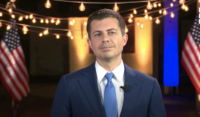Leading airport groups—and other aviation organizations—are praising President Joe Biden’s choice of Michael G. Whitaker, a former deputy administrator of the Federal Aviation Administration, as his nominee to head the agency.
In announcing his selection of Whitaker on Sept. 7, Biden is seeking to fill the top post at a high-profile U.S. Dept. of Transportation agency that has been led by acting administrators since March 2022.
Transportation Secretary Pete Buttigieg said in a statement, “America needs a confirmed FAA Administrator and Mike Whitaker is the right leader for the job. He knows aviation, he knows safety, he knows the FAA and he knows how to manage and modernize larger organizations."
If confirmed by the Senate, Whitaker would oversee a sizable infrastructure budget. The core is its Airport Improvement Program (AIP), which provides about $3 billion per year for runways and other airfield infrastructure projects.
FAA’s infrastructure portfolio received a major boost in the 2021 Infrastructure Investment and Jobs Act, which provided the agency with an additional $25 billion over five years for terminals, control towers and other projects.
Praise from Airport Groups
Todd Hauptli, American Association of Airport Executives president and CEO, said, “Permanent leadership at the agency is long overdue.”
Hauptli said of Whitaker, “Mike has broad experience advancing the cause of aviation both inside and outside of government and is highly regarded for his leadership abilities, dedication to the industry and willingness to tackle difficult challenges.”
Kevin Burke, Airports Council International-North America president and CEO, said, “Mike Whitaker brings immense experience in aviation—including his tenure as the FAA’s deputy administrator—that will allow him to engage immediately in important policy, regulatory and infrastructure funding priorities we continue to confront.”
Most recently, Whitaker has been chief operating officer of Supernal, automaker Hyundai's air-taxi company. Earlier in his career he spent 15 years at United Airlines, rising to be a senior vice president. A lawyer by training, Whitaker also is a private pilot.
In March, Biden’s previous choice to head the FAA, Denver International Airport CEO Phillip Washington, withdrew as a candidate for the position after facing opposition from Senate Republicans. They contended he lacked the right background for the position.
In April 2022, then-Deputy Administrator Billy Nolen became FAA acting head. In June of this year, U.S. DOT Deputy Secretary Polly Trottenberg took on the added role of acting FAA administrator.
But the federal Vacancy Act limits the tenure of an acting agency head. Trottenberg in an Aug. 16 letter told FAA staff that under that statute, she will be leaving her FAA position as of Oct. 25. Trottenberg will remain DOT deputy secretary.
If no new administrator is confirmed by then, Trottenberg's successor as acting FAA administrator would be Katie Thomson, the agency's No. 2 official.
Coming Up: Senate Hearing
Administration official are hoping that the Senate will confirm Whitaker and end the string of acting FAA leaders.
Senate Commerce, Science and Transportation Committee Chair Maria Cantwell (D-Wash.) indicated her support for the nominee. She noted that "there is no shortage of issues before the FAA." Cantwell added, "Mr. Whitaker will use his substantial aviation experience and knowledge to meet these challenges. I look forward to working width him and his strong leadership at the agency."
The committee's top Republican, Ted Cruz (Texas), who was previous nominee Washington's strongest Senate critic, said, "After several near-misses, chronic air traffic controller staffing shortages and ongoing problems with implementing new technology at the FAA, we must carefully evaluate Mike Whitaker's qualifications, experience and temperament to determine whether he is the right person to lead the agency at this critical juncture."
New FAA Bill Still in the Works
The swirl of activity about a new FAA leader comes as Congress pushes ahead on a new FAA authorization bill. The current measure expires on Sept. 30, but at this date, a stopgap measure seems likely.
The House passed its five-year FAA bill in July by a large, bipartisan majority.
In the Senate, Cantwell and Cruz introduced their FAA bill in June, but the measure stalled and no visible progress occurred before the August break.
Both versions propose a solid 19% hike for AIP grants, to $4 billion a year.






Post a comment to this article
Report Abusive Comment